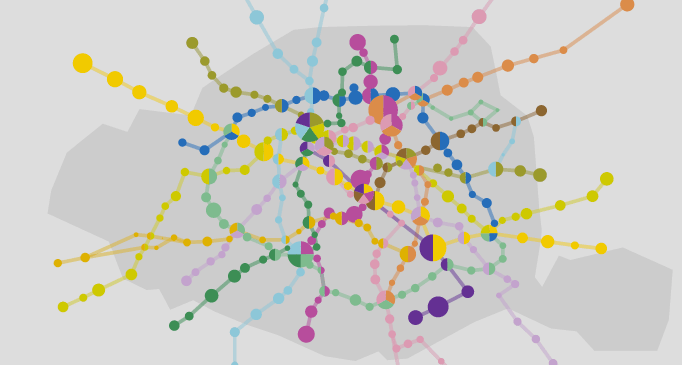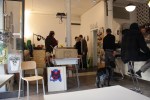Tag: transportation
Trafic annuel entrant par station à Paris

RATP just released an interactive map showing the number of people passing through each metro station per year. Gare du Nord is first with 48,146,629 people, followed by Gare St-Lazare and Gare de Lyon.
Source and interactive map: http://labs.data-publica.com/ratp/
Pour Invalides changez à l’Opéra
I think this song will always remind me of this past year.
Small towns, slow food
Because I clearly needed a vacation from my already vacation-like life, I took a train to Italy last month to visit Maria, an old friend from Oakland and Berkeley who is currently studying gastronomy in Pollenzo (the birthplace of the “Slow Food” movement).
Maria and most of her other culinarily-inclined friends live in a nearby town called Bra. I’ve visited the large urban tourist destinations in the rest of Italy (e.g. Rome, Venice, Florence) but I was looking forward to spending time in a more anonymous small town. I was not disappointed—the uniqueness of its location (in the Northern Italian region of Piemonte) was evident from the start. I arrived at the surprisingly run-down station of Torino Porta Susa, which included hole-in-the-floor “restrooms,” and somehow figured out how to purchase a second train ticket to Bra from a machine that was yelling at me in heavily-accented English while a gypsy asked me for money. I didn’t know you had to punch your ticket before getting on the train (what is this, the 1950s??) and there was no sign telling me to do so, but luckily I was never asked for my ticket on this particular ride. The train itself was nice, but where was the detailed map indicating the route of the train and all the serviced stops? Clearly, I was not in Paris anymore. Luckily Bra was the terminus of the train, otherwise I would never have known where to get off—almost none of the deserted-looking stations we passed had any signs on them whatsoever. But after about 45 minutes of staring at the regal, awe-inspiring Alps in the distance with only a vague uneasiness as to where on Earth I was, I arrived at my destination. And it was well worth the effort. Bra is beautiful, quiet, charming…adorned with gorgeous buildings, cobblestone streets, and a few central stylish cafés.
Continue reading “Small towns, slow food”
Notes from Meaux-town*
Every Monday and Tuesday I wake up around 6am, get ready and head to Gare de l’Est, from which I take a train to Meaux, a small town of around 50,000 people East and slightly North of Paris. This is where I spend two days teaching English to around 14 primary-school classes of children aged anywhere from 6 to 11. Notice I say “teach”—while I have no teaching credential and am supposed to be an “assistant” who merely helps the teachers with their English lessons, offers the correct pronunciation of words, maybe plans a few activities, the program and schools themselves are highly disorganized when it comes to English and so somehow I am essentially the English teacher.
Meaux is a town with a large immigrant population and an allegedly racist mayor. Besides a vaguely quaint town center with a cathedral and a somewhat substantial reputation for Brie and mustard, there’s not a whole lot to report on. When I arrive at the train station I hop on a bus and bypass the center anyway, heading instead for the neighboring industrial zone. This is where my schools are located, surrounded by housing projects. This doesn’t have the same connotation as “the projects” in the US do, but it does feel a million miles away from Paris. More than anything, it can feel dreary and rather deserted. The teachers, not knowing that I was placed in the town by the teaching assistant program, have asked me confusedly, “but why did you choose Meaux?” Riding the bus here I feel totally anonymous, and an English title on the book I’m reading will generally get me a few looks. It’s a complete contrast to cosmopolitan life-as-spectacle Paris, and that’s one reason I’m grateful for the experience.

Though Meaux doesn’t feel as “cosmopolitan” as Paris, ironically my schools represent a sort of mini-multicultural utopia that Paris could only dream of coming close to. The students have more diverse origins than anywhere I’ve ever seen: North and West Africa are probably the most commonly represented, but there’s also Yemen, the Congo, Pakistan, Bangladesh, Portugal, Poland, Greece, French territories (like Martinique, Réunion, and French Guyana), Romania, China…and that list probably doesn’t even cover it. One lesson the kids loved was learning how to pronounce these countries in English.
Continue reading “Notes from Meaux-town*”














